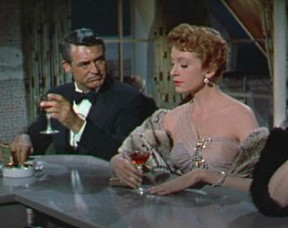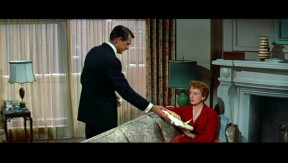What The Godfather is to the male of the species, An Affair to Remember is to those who propagate the species. It makes women believe in that crazy little thing called love. Without us identifying with and holding up as ideal this paean to pure emotion, entirely devoid of, thank God, realistic flourishes, you would not be here to read this. It’s a movie so sentimental, it has become the stuff of humour, referenced in other movies (most famously in Sleepless in Seattle, its modern remake), but laugh at it to our face and you better have taken out life insurance.
So why is this film sacrosanct and the first pick for girls’ night in circa 2011, more than 50 years after it was made? Very possibly, because of the people who played the leads. Not even Hanks and Ryan could compete with Sleepless…
Cary Grant and Deborah Kerr were sublime as lovers fated to meet and the stuff of their romance is so, for want of a better word, pure, that it has remained iconic. Nickie Ferrante is an international playboy with a fiancée in the works and nothing in the way of life-choices but his looks and charm paving the way to hell with nary a good intention in sight. Terry McKay is a girl from Boston hoping to make it as a singer with a betrothed also waiting eagerly in the wings.
They meet on board a ship, making its portentous way to New York. From the first moment they lay eyes on each other, the witty, sophisticated dialogue holds us in thrall; we laugh, we sigh, we watch in delight as their personas embrace. They are not innocents, yet this is their first try at love and surely they know better than to give in without a fight? So as they discover who they are with each other, as they visit Nickie’s grandmother in the French Riviera and Terry recognizes that her home is wherever Nickie’s past and present are, they hold back for a moment. In six months time, they say, they will meet at the top of the Empire State Building if they still feel the same, and if Nickie can earn a living as a painter.
The day comes, and she runs through traffic because she can’t wait in the taxi. She’s looking up at the tallest building in the world, where her love waits – and the next thing you hear are the wrenching sounds of metal.
Nickie waits and waits. Later, he makes it as a painter, one of his most famous is one of Terry. Cut to months down the line. Terry is sitting at a concert hall with her old boyfriend and as she gathers her things, she looks up and there’s Nickie, debonair with a beauty on his arm, just the way he always is. Stunned, all she can say is, “hello.” She doesn’t have him at “hello.”
His returning look is a masterpiece; in it there is contempt, indifference, a trace of fury, subconscious yearning, bewilderment, and his own, “hello” is a knife thrown straight at her heart. As he leaves, and the hall empties, the boyfriend goes down the aisle and comes back with – a wheelchair.
The final scene is when the Kleenex comes in handy. Nickie finds her apartment and walks in to see her languidly, rudely, lying on the sofa. He is bitter and hurtful and she does not defend herself. He is about to leave when he says how his portrait of her was sold to a woman in a wheelchair. He looks at her and the penny drops. He runs into the bedroom for proof because the truth is too awful to contemplate and he sees the painting. Like I have refrained from detailing the funny shipboard scenes, the moving encounter with the grandmother, the little asides from the minor characters who round off the film so perfectly, I will refrain from revealing all the lines that have since become immortal, the most famous ones are during this last scene.
You need to experience that yourself, and allow your own subconscious yearning a break for one night.
Sheba Thayil is a journalist and writer. She was born in Bombay, brought up in Hong Kong, and exiled to Bangalore. While editing, writing and working in varied places like The Economic Times, Gulf Daily News, New Indian Express and Cosmopolitan, it is the movies and books, she says, that have always sustained her.







